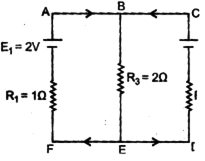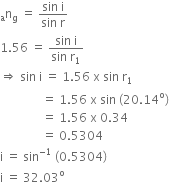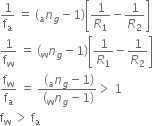 Long Answer Type
Long Answer Typea) Two point charges Q1 = 400  and Q2 = 100
and Q2 = 100  are kept fixed, 60 cm apart in vacuum.Find intensity of the electric field at midpoint of the line joining Q1 and Q2.
are kept fixed, 60 cm apart in vacuum.Find intensity of the electric field at midpoint of the line joining Q1 and Q2.
b) i) State Gauss' law.
ii) In an electric dipole, at which point is the electrical potential zero?
a) Obtain an expression for equivalent capacitance when three capacitors C1, C2 and C3 are connected in series.
b) A metallic wire has a resistance of 3.0 ohm and 0o Cand 4.8 ohm at 150o C. Find the temperature coefficient of resistance of its material?

a) Draw a labelled circuit diagram of a potentiometer to measure internal resistance of a cell. Write the working formula.
b) i) Define Curie temperature.
ii) If magnetic susceptibility of a certain magnetic material is 0.0001, find its relative permeability.
 Short Answer Type
Short Answer Typei) Two infinitely long current carrying conductors X and Y are kept parallel to each other, 24 cm apart in vacuum. They carry currents of 5 A and 7 A respectively, in the same direction, as shown in the figure below. Find the position os a neutral point, i.e., a point where resultant magnetic flux density is zero.
ii) If current through the conductor Y is reversed in direction, will neutral point lie between x and Y, to the left of X or to the left of Y?
i) Define Ampere in terms of force between two current carrying conductors.
ii) What is an ideal transformer.
 Long Answer Type
Long Answer Typea) A coil having self-inductance of 0.7 H and resistance of 165 ohm is connected to an ac source of 275 V, 50 Hz. If  .
.
Calculate:
i) reactance of the coil
ii) impedance of the coil
iii) current flowing through the coil
b) Draw a labelled graph showing variation of impedance of a series LCR circuit with frequency of the a.c. supply.
a) Derive Snell's law of refraction using Huygen's wave theory.
b) Monochromatic light of wavelength 650 nm falls normally on a slit of width 1.3 x 10-4 and the resulting Fraunhofer diffraction is obtained on a screen. Find the angular width of the central maxima.
a) In Young's Double Slit experiment, show that: , where the terms have their usual meaning.
, where the terms have their usual meaning.
b) A ray of ordinary light is travelling in air. It is incident on air-glass pair at a polarising angle of 56o. Find the angle of refraction in glass.
a) Given,
 [ because it is a regular glass prism]
[ because it is a regular glass prism]
Using Snell's Law, at the face AC,
sin r2 = 
r2 = sin-1(1/1.56)
r2 = sin-1 (1/1.56)
i.e., r2 = 39.86o
Now,

 = 1.5
= 1.5 ) = 1.33
) = 1.33




